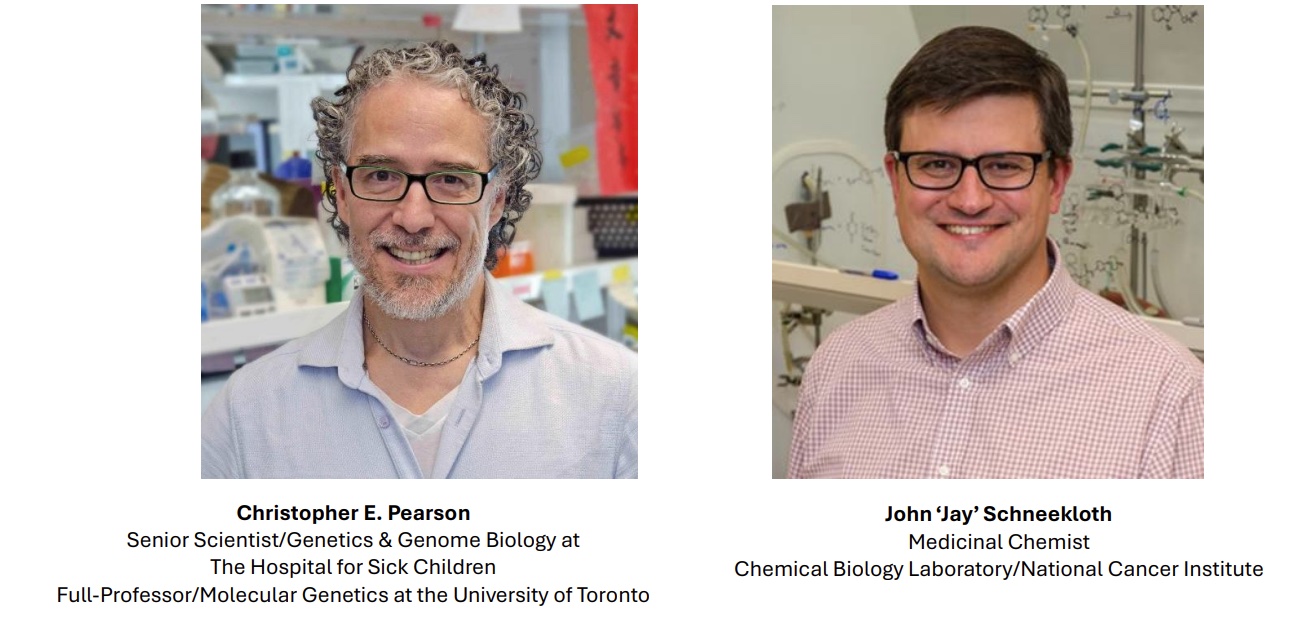$1 Million Awarded for Huntington’s Disease Research
NEW YORK – The Huntington’s Disease Foundation (HDF), whose mission is to fund transformative research for Huntington’s disease (HD), has announced Christopher E. Pearson, PhD, a human geneticist from The Hospital for Sick Children (SickKids) in Toronto, Canada, as the 2025 recipient of its $1 Million 2025 Transformative Research Award. This 2-year grant will be used to support the development of small molecules to contract the CAG repeat expansion within the HTT gene that causes HD, encouraging the mutation to shrink below the length that leads to symptoms. The hope is to develop a treatment for HD.
Dr. Pearson is partnering with Dr. Jay Schneekloth from the National Institutes of Health’s National Cancer Institute on this project, “Slipped-DNA Ligands that Contract Expanded Repeats for Therapeutic Benefit.” They have also recruited a team of top-tier medicinal chemists, including Dr. Jeffery Kelly from Scripps Research Institute.
HD is caused by an expansion of the genetic letters C-A-G within the huntingtin gene. Triggering contractions of the expanded CAG repeat back towards shorter non-disease lengths in the brain would represent a transformative step for people with the HD gene, potentially delaying or even preventing the onset and progression of the disease itself.
“We are thrilled to present this award to Dr. Pearson who has demonstrated a profound commitment to Huntington’s disease research. This is the fourth Transformative Research Award presented by the Huntington’s Disease Foundation and we are confident that this award mechanism will continue to promote truly novel and exceptional research and encourage cooperation among scientists working toward treatments for HD,” says Meghan Donaldson, CEO, HDF.
Dr. Pearson is a global leader in the study of repeat expansion disorders, including HD. He has been at the forefront pioneering this field for over 30 years and was one of the first scientists to reveal how the CAG mutation, which causes HD, continues to expand in the brain over time. Dr. Schneekloth is a leader in small molecule drug discovery and RNA/DNA-binding chemistry. They will use cutting-edge screening approaches, including artificial intelligence, to identify and optimize molecules that precisely target the CAG mutation.
“I am so pleased our team was awarded these funds, which will accelerate the research we are driving to target Huntington’s disease at its root cause by reversing the disease-causing expansion and moving us towards the first potential disease-modifying therapy for HD, and possibly for other repeat expansion diseases in the future. We are committed to accelerating this work with the hopes of transforming the lives of affected families,” says Dr. Pearson.
“The approach of targeting nucleic acids directly using medicinal chemistry is gaining traction for both neurodegenerative diseases and cancer. This grant will allow us to push the limits for what is possible in developing effective treatments for Huntington’s disease,” states Dr. Schneekloth.
“The drugs being studied in this proposal are the first known approach to actually contract the expanded CAG sequence in the brain,” says Sarah Hernandez, PhD, Director of Research Programs, HDF. “Dr. Pearson is the perfect person to carry out this work. He was the first to have proof-of-concepts studies showing this is possible in mice that model HD. This research could develop desperately needed novel therapeutics.”
The Transformative Research Awards were made possible through a partnership between the Huntington’s Disease Foundation and a generous group of anonymous donors. These million-dollar awards, HDF’s largest grants, support collaborative teams developing new approaches to study Huntington’s disease mechanisms and treatments.
About the Huntington’s Disease Foundation
The Huntington’s Disease Foundation (HDF) funds transformative research to find treatments, and ultimately a cure, for Huntington’s disease (HD) and other related disorders. Research organized by HDF led to the discovery of the genetic marker for HD and the gene that causes HD. Huntington’s disease is a fatal, inherited brain disorder that causes psychiatric changes, cognitive problems, and uncontrollable movements that progress over 10-20 years. Each child of an afflicted parent has a 50% risk of inheriting the gene which causes the disease. Currently there is no cure.
Click here to learn more about the Transformative Research Awards.
Contact: Debra Karrat, 917-842-7366 / debrakarrat@hdfoundation.org

